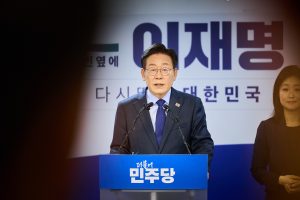With impeached President Yoon Suk-yeol’s fate hinging on a pending Constitutional Court decision, whispers of possible new presidential elections are growing louder.
If the court upholds parliament’s motion and formally removes Yoon from office, South Koreans would head to the polls within 60 days to vote for a new leader.
Opposition Democratic Party leader Lee Jae-myung currently dominates hypothetical polls with 37 percent, according to the latest Gallup Poll. Trailing behind him are Han Dong-hoon, the recently displaced ruling party leader, and Hong Joon-pyo, the flamboyant conservative mayor of Daegu.
While politics is notoriously unpredictable, Yoon’s potential ousting would pave a strong path for a left-wing resurgence to the presidency. Recent history points in that direction. In May 2017, liberal Moon Jae-in secured a decisive victory in an early presidential election following the impeachment and downfall of conservative President Park Geun-hye.
But this time around, an unexpected variable could complicate this seemingly plausible repeat scenario. Opposition leader Lee is grappling with numerous legal woes of his own, which would present significant hurdles to his presidential bid.
In November, Lee was convicted of violating election laws, a decision that, if upheld by the Supreme Court before the next presidential election, would bar him from running. Under the Public Official Election Act, rulings in the second and third trials of election violation cases must be issued within three months of the previous court sentence.
This means the appeals court hearing Lee’s case must rule within three months of the trial court’s decision on November 15. If the defendant chooses to appeal, the Supreme Court will have another three months to decide. Although this timeline has been loosely observed in the past, it is expected to be enforced more rigorously following the Chief Supreme Court Justice’s directive in September.
Should Yoon fall, the timing of the Constitutional Court’s ruling could set the stage for a presidential election as early as April or May next year. As such, Lee appears to be working to delay his trial proceedings while maneuvering for Yoon’s court-ordered ouster.
On December 18, after two failed attempts, the appeals court finally delivered a notice of receipt of the litigation records to Lee. He now has 20 days to submit a statement of appeal for his election law violation conviction.
The first delivery attempt failed when Lee moved homes, leaving his new address unclear. A second attempt was unsuccessful due to the recipient’s absence. The latest attempt succeeded only after the court dispatched an execution officer to hand-deliver the documents to Lee’s office in Yeouido. Without the notice, the appeal process cannot proceed.
Lee is also facing a third-party bribery trial, where the presidential aspirant is accused of requesting Ssangbangwool Group, a South Korean underwear company, to illicitly funnel $8 million to North Korea to facilitate his planned visit to Pyongyang while serving as governor of Gyeonggi Province.
In June, a former deputy governor of Gyeonggi Province was sentenced to nine and a half years in connection with the case. That same month, Lee was indicted and has since been rebuked for allegedly dragging out his court proceedings. Earlier this month, Lee’s legal team filed a motion to recuse judges presiding over his case. Prosecutors have criticized the motion, warning it will cause “unprecedented delays” to the trial. An appeals court recently affirmed the ex-deputy governor’s guilty verdict.
If Lee is convicted of third-party bribery, it would deliver a serious blow to his political reputation and further hurt his chances of assuming the helm, especially as he remains entangled in three other criminal trials.
While strategically prolonging his legal fights, Lee seems to be bidding to expedite Yoon’s impeachment trial — and for good reason. With his liberal rival, Cho Kuk, now imprisoned and the ruling People Power Party in total disarray, the formal removal of Yoon would create an unobstructed path to the presidency for Lee.
Previously hesitant, Lee and his camp are now desperately moving to fill three vacant seats on the Constitutional Court. Currently, the court is operating with a six-member panel after three justices’ tenure expired in October. The court has decided to hear the president’s impeachment case with its present composition, but a unanimous vote would be required to remove Yoon. If the court were fully staffed, at least six votes would be needed.
Complicating matters for Lee is that Yoon’s appointee, Justice Cheong Hyungsik, is the presiding and commissioned justice to handle the impeachment case.
Two justices are considered liberal, three lean center-right, and Cheong is firmly right-wing. If even one justice rejects the motion, Yoon will be reinstated to complete his tenure. The three vacant seats up for nomination by parliament have thus become hot political bargaining chips. By sending two more liberal-leaning justices to the bench, the opposition hopes to boost the chances of Yoon’s removal from office.
The process, however, can take weeks and will require the acting president’s appointment of the justices.
To be fair, the opposition leader is not the only one seemingly drawing out his trial. Yoon and his legal team have come under fire for what critics see as an arsenal of “delay tactics.” Despite the president’s promise to confront his legal battles head-on, he has reportedly refused to accept documents and orders from the Constitutional Court.
On Monday, the court’s spokesperson announced that the trial would proceed regardless, with the first hearing against Yoon, the ex-prosecutor general, set for December 27.
From Yoon’s aborted martial law decree to his parliamentary impeachment and Lee’s courtroom dramas, South Korea has been rocked by dramatic events in recent weeks. Yet, the turbulence seems far from over — more shock and awe may loom on the horizon.

































